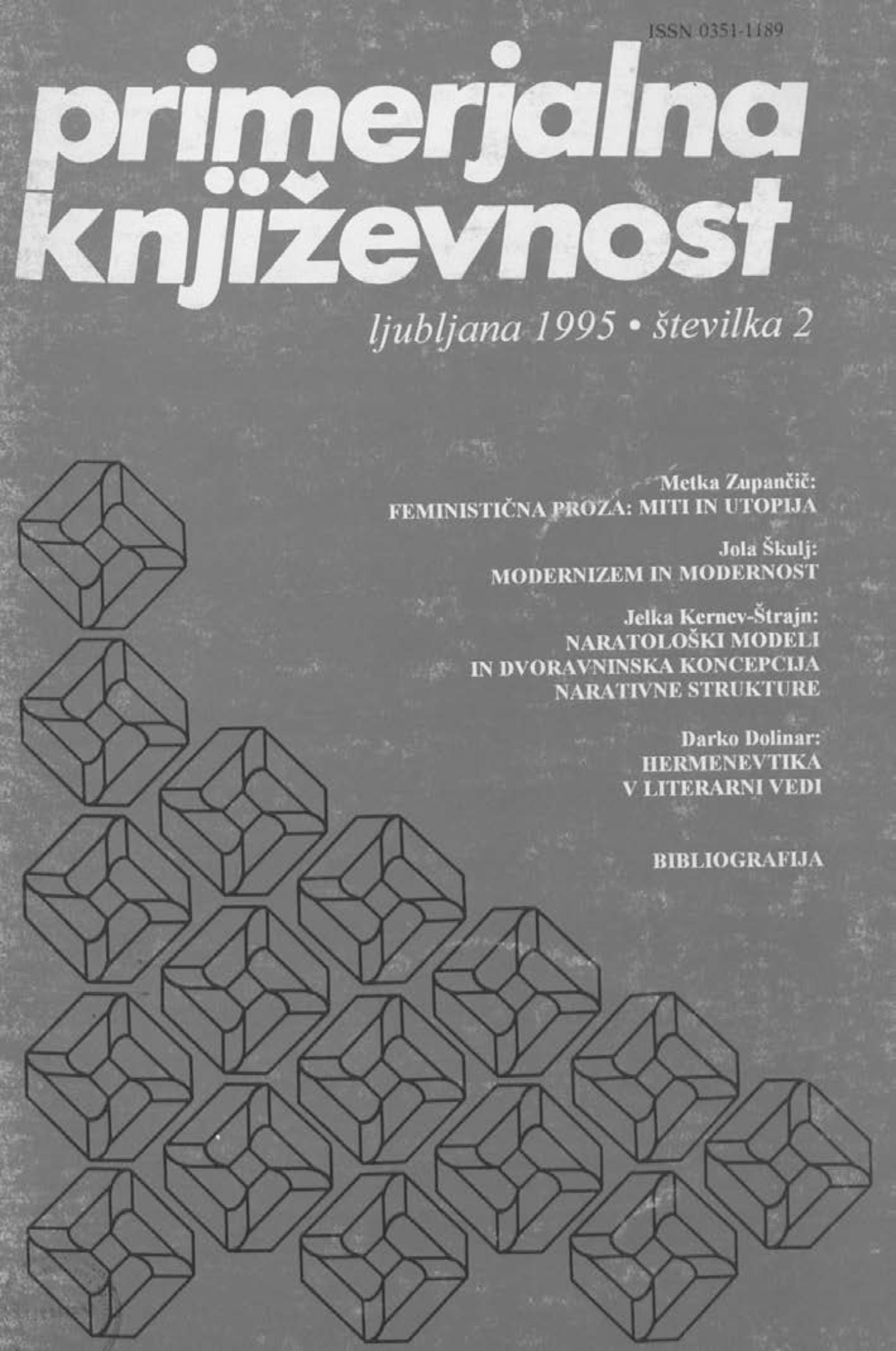Modernism and Modernity
Keywords:
modernism and modernity, consciousness of historicity as an ever reinterpreting fact, concept of detotalized truthAbstract
The article delimitates the concept of modernity and the period term modernism. Modernity, the quality of being modem, applies to a much wider span of time than modernism and its meaning went through certain phases of change in its history. Special consideration is given to some of the most important interpretations of modernity (Calinescu, Vattimo, de Man) and the most delicate shifts in the meaning of the notion of modernity that occurred in the second half of the 19th century are thoroughly reconsidered. Reinterpretation of modernity by Baudelaire and the philosophical views of Nietzsche were due to the changes in thoughts and arts at the end of postromanticism that brought to the event of modernist movements. This modification in the meaning of modernity implies consciousness of historicity as an ever reinterpreting fact, and consequently, the concept of truth was detotalized what finally brought to the establishment of modernism and its artistic structure.References
BAHTIN 1981: Mihail Mihajlovič Bahtin, Michael Holquist (ur.), The Dialogic Imagination. Four Essays, Austin 1981.
BAHTIN 1983: Mihail Mihajlovič Bahtin, Teorija romana, Ljubljana 1983.
BAUDELAIRE 1961: Charles Baudelaire, Œuvres complètes, Pariz 1961.
BAUDELAIRE 1968: Charles Baudelaire, Œuvres complètes, Pariz 1968.
BAUDELAIRE 1977: Charles Baudelaire, Rože zla, Ljubljana 1977.
BERGONZI 1968: Bernard Bergonzi (ur.), Innovations: Essays on Art and Ideas, London 1968.
BERGONZI 1986: Bernard Bergonzi, The Myth of Modernism and 20th Century Literature, Brighton 1986.
BRADBURY in MCFARLANE 1976: Malcolm Bradbury, James McFarlane (ur.), Modernism, 1890–1930, London 1976.
BARTHES 1953: Roland Barthes, Le degré zéro de l’écriture, Pariz 1953.
CALINESCU 1977: Matei Calinescu, Faces of Modernity: Avantgarde, Decadence, Kitsch, Bloomington 1977.
DE MAN 1970: Paul de Man, »Literary History and Literary Modernity«, v: Daedalus, Spring 1970, str. 384–404.
DE MAN 1971: Paul de Man, Blindness and Insight, New York 1971.
ELLMANN in FEIDELSON 1965: Richard Ellmann, Charles Feidelson, jr. (ur.), The Modern Tradition: Backgrounds of Modern Literature, New York, London 1965.
FOKKEMA 1980: Douwe W. Fokkema, »The Code of Modernism«, v: Proceedings of the 8th Congress of the ICLA, Budimpešta 1980, str. 679–685.
FOKKEMA 1984: Douwe W. Fokkema, Literary History, Modernism, and Postmodernism, Amsterdam, Philadelphia 1984.
FOKKEMA 1987: Douwe W. Fokkema, Elrud Ibsch, Modernist Conjectures: A Mainstream in European Literature 1910–40, London 1987.
GODZICH 1994: Wlad Gozdich, »In Quest of Modernity«, v: The Culture of Literacy, Cambridge, Mass., 1994, str. 247–256.
HABERMAS 1981: Jürgen Habermas, »Die Moderne – ein unvollendetes Projekt«, v: Kleine politische Schriften, Frankfurt 1981.
HABERMAS 1985: Jürgen Habermas, Der philosophische Diskurs der Moderne. Zwölf Vorlesungen, Frankfurt 1985.
HOWE 1967: Irving Howe, Literary Modernism, Greenwich, Conn. 1967.
JAMESON 1984: Fredric Jameson, »Foreword«, v: Jean-François Lyotard, The Postmodern Condition, Manchester 1984.
JAUSS 1965: Hans Robert Jauss, »Literarische Tradition und gegenwärtiges Bewusstsein der Modernität«, v: Hans Steffen (ur.), Aspekte der Modernität, Göttingen 1965, str. 150–197.
JAUSS 1987: Hans Robert Jauss, »Der literarische Prozess des Modernismus von Rousseau bis Adorno«, v: Reinhart Herzog, Reinhart Kosellek (ur.), Epochenschwelle und Epochenbewusstsein, München 1987, str. 243–268.
KERMODE 1968: Frank Kermode, Continuities, London 1968.
KERMODE 1971: Frank Kermode, Modem Essays, London 1971.
KOHLER 1977: Michael Kohler, »’Postmodernismus’: Ein begriffsgeschichtlicher Überblick«, Amerikastudien (22:1), 1977, str. 3–18.
LEVIN 1960: Harry Levin, »What Was Modernism?«, v: Refractions: Essays in Comparative Literature, New York, London 1966.
LODGE 1979: David Lodge, »Historicism and Literary History: Mapping the Modern Period«, New Literary History (10:3), 1979, str. 547–556.
LODGE 1981: David Lodge, »Modernism, Antimodernism, and Postmodernism«, v: Working with Structuralism, London 1981, str. 3–16.
LYOTARD 1984: Jean-François Lyotard, The Postmodern Condition, Manchester 1984.
NIETZSCHE 1988: Friedrich Nietzsche, Onstran dobrega in zlega. H genealogiji morale, Ljubljana 1988.
NIETZSCHE 1989: Friedrich Nietzsche, Somrak malikov. Primer Wagner. Ecce homo. Antikrist, Ljubljana 1989.
OED 2: The Oxford English Dictionary, Second Edition on Compact Disc, Oxford 1992.
POGGIOLI 1962: Renato Poggioli, Teoria del l’Arte d’Avanguardia, Bologna 1962.
RIHA 1993: Rado Riha, »Dekonstrukcija in končnost subjekta«, Primerjalna književnost (16:1) 1993, str. 61–67.
RUSS 1994: Jacqueline Russ, La marche des idées contemporaines. Un panorama de la modernité, Pariz 1994.
SCHULTE-SASSE 1987: Jochen Schulte-Sasse, »Modernity and Modernism, Post-modernity, and Post-modernism: Framingthe Issue«, Cultural Critique, 1987, št. 5, str. 5–22.
STEFFEN 1965: Hans Steffen (ur.), Aspekte der Modernität, Göttingen 1965.
STENDHAL 1817: (Henri Beyle) Stendhal, Histoire de la peinture en Italie, 1817, v: Stendhal, Œuvres complètes, vol. XVI, Pariz 1955.
TOYNBEE 1934: Arnold Toynbee, A Study of History, Oxford 1934.
VATTIMO 1991: Gianni Vattimo, The End of Modernity, Oxford 1991.
VATTIMO 1992: Gianni Vattimo, The Transparent Society, Baltimore 1992.
URBANČIČ 1988: Ivan Urbančič, »Kritični obrat modernosti«, v: Nietzsche, Onstran dobrega in zlega. H genealogiji morale, Ljubljana 1988, str. 347–401.
WORRINGER 1908: Wilhelm Worringer, Abstraktion und Einfühlung, 1908.


